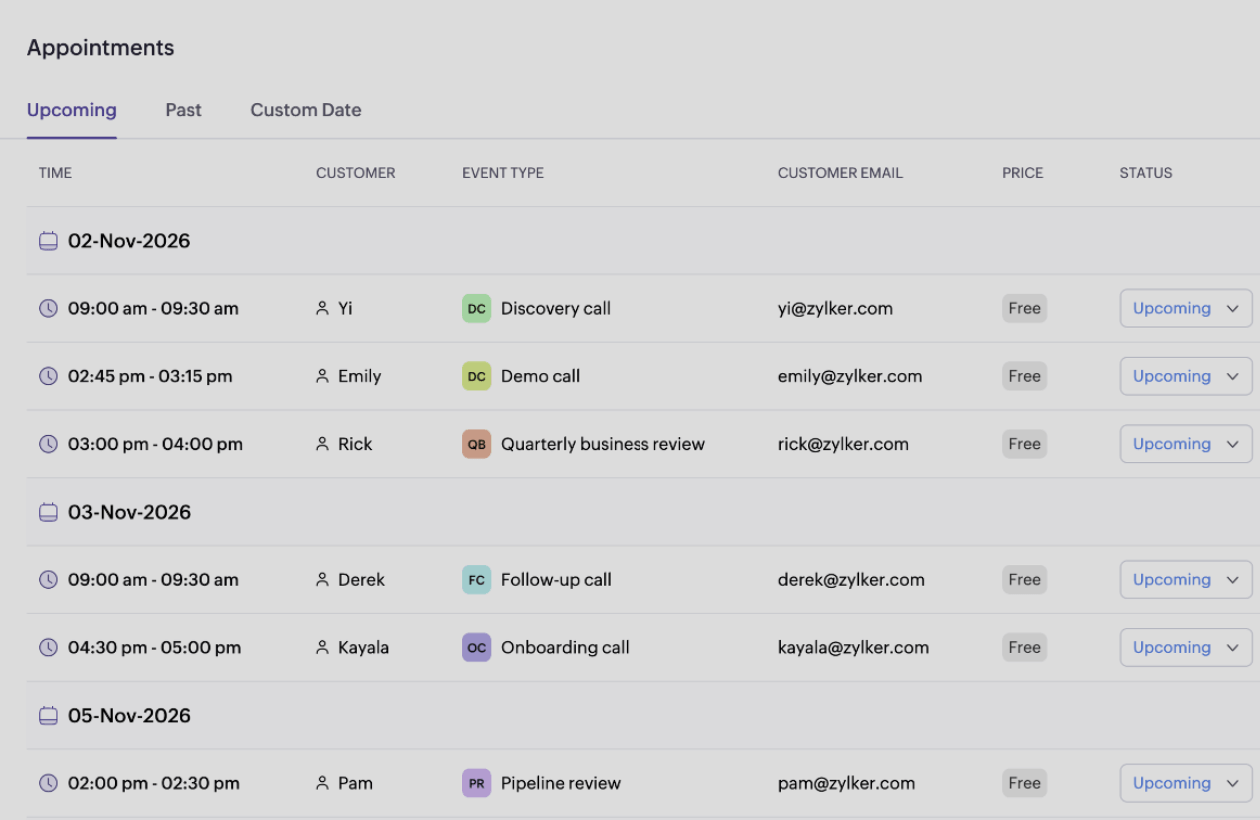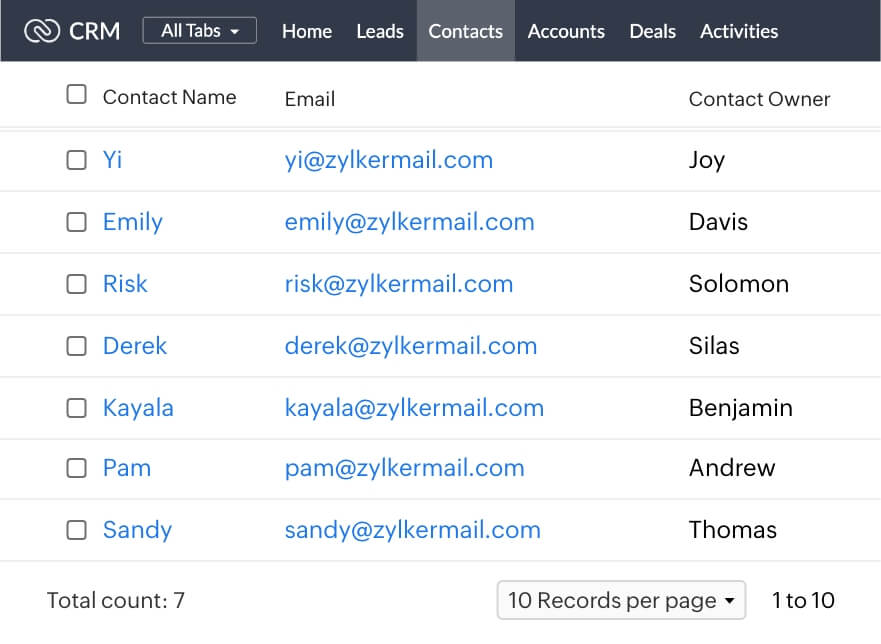How to qualify leads and accelerate your sales pipeline
- What is lead qualification?
- Different types of leads
- 5 important lead qualification steps
- Lead qualification and appointment scheduling
- Lead qualification frameworks
- Scheduling automation with Zoho Bookings
Just because someone comes across your brand or marketing campaigns doesn't make them a lead—yet. They're simply exploring their options and evaluating solutions similar to yours.
It's when they take that next step to interact with your campaigns, share their contact information, or sign up for your product that they become a lead. That's your time to qualify them and find out if they're a good match.
What is lead qualification?
Lead qualification is the process of determining whether a lead is a good fit for your service or product. Sales reps use various tools, strategies, and frameworks to qualify a lead.
What are the different types of leads?
MQL
Marketing-qualified leads are members of your target audience who have interacted with your marketing campaigns, like downloading an e-book, subscribing to your newsletter, or engaging with your webpages. They've shown interest in your product, but they aren't ready to make a purchase. Marketing teams nurture them as they progress through the buying journey.
SQL
Once a lead is ready to discuss their purchase decision with sales, they become a sales-qualified lead. The MQL to SQL transition occurs when the lead score reaches a certain threshold in your CRM, such as when they request a quote or when they're qualified by a sales rep guided toward a deal. Lead-score criteria varies depending on the organization.
PQL
Product-qualified leads are your target audience that has used your product—usually by signing up for your free trial. Since they're actively using your product, they're ideal candidates for follow-up so the sales team can convert them into a paying customer.
Five important lead qualification steps
1. Define your ideal customer profile (ICP)
Outlining your target audience is crucial, not just for lead qualification but for the overall success of your business. Your ICP represents the buyer who is the best fit for your solutions and is most likely to convert. It involves attributes like firmographics, roles, industry, tech stack, and other relevant details. Defining the ICP makes it easier for sales and marketing teams to generate, qualify, and convert leads.
2. Capture leads
Once you've established your ICP, marketing teams can start generating leads through a variety of channels. Depending on your business, they may collect lead information via web forms, webinars, newsletters, chatbots, or digital ads. If your business engages in outbound marketing, sales and marketing teams should ideally collaborate to target leads based on your ICP and initiate conversations through targeted campaigns.
3. Qualify and score leads
Once leads are generated, sales and marketing teams start qualifying and filling the sales pipeline with potential opportunities. Sales teams often use various lead qualification frameworks to engage and further qualify MQLs. Additionally, setting up scoring criteria within your CRM or lead generation tools based on factors like engagement level, buying signals, and fit helps you prioritize leads and track their interactions with your business to determine their buying intent.
4. Automate sales scheduling
Don't lose a hot lead due to a delay in assigning a sales rep or scheduling a meeting. Response time is key. Implementing scheduling automation around your sales meetings with Zoho Bookings can help you meet, qualify, and convert leads faster.
With scheduling software, you can also skip the manual lead qualification process by:
- Adding a booking widget directly on your website so leads can quickly schedule a meeting with your sales teams
- Routing leads after they submit your web form. You can set up routing criteria in your existing web forms based on the answers they provide, and qualified leads can then book a meeting with sales.
5. Analyze and iterate
Continuously evolve your lead qualification process based on lead quality and customer conversion ratio. If you're not seeing results, try out a different qualification framework, explore new marketing campaigns, revise the lead scoring criteria, and invest in lead qualification tools can help refine your existing process for better conversion.
Why lead qualification needs scheduling
Sales teams typically qualify leads via a call or a meeting, and this is where they gather the most valuable information to assess if a lead is a good fit for the product or service.
Lead qualification frameworks guide sales reps through the assessment—but if there’s a delay in scheduling, the pipeline can lose momentum or even break down.
With scheduling software like Zoho Bookings, you avoid delays and back-and-forth, so your qualification process stays seamless.
With Zoho Bookings, you can:
- Create various meeting types and let customers self-schedule with your booking links.
- Eliminate no-shows by configuring automated email notifications and reminders.
- Automatically sync your schedules with your calendar and share virtual meeting links.
- Collect relevant information from leads with a booking form.
- Manage your team's appointments from one place.
- Configure workflows to automate tasks around your meetings.
Common lead qualification frameworks:
1) BANT
The budget, authority, need, and timeline (BANT) framework helps you cut to the chase and understand whether a lead has real potential.
Budget: Does the lead have the budget to proceed? Understanding this early on helps you prioritize the lead and guide them through the different options accordingly.
Authority: Who is the final decision-maker, and are you speaking with them? Identifying the key stakeholder and involving them in meetings helps accelerate the sales process.
Need: Does your solution meet the lead's needs? You can determine whether your product or service is a good fit based on the problems they hope to resolve.
Timeline: When is the lead going to make use of your product or service? Knowing the answer to this helps you prioritize and work with them accordingly.
2) SPIN
The situation, problem, implication, and need-payoff framework (SPIN) is designed to help you gather as much information as possible from your leads. Each step of the framework requires you to ask relevant questions to qualify and close deals.
Situation: Get an overall understanding of how the business functions, the tools they use, and the pain points they face.
Problem: Ask questions based on the lead's pain points to gain a deeper understanding of the problem. This helps you qualify them further and position your offering as a solution.
Implication: Explore the possible outcomes or effects of those paint points. Questions asked at this stage will reiterate to the lead how their current solution is stalling their progress.
Need-payoff: With all the information gathered, you can now ask questions that show your lead the value of using your product or service. This is the final stage, where leads buy into the idea that your offering can help their business progress.
3) MEDDIC
MEDDIC is a comprehensive framework that helps sales teams effectively sell to large organizations. It enables you to gather relevant information to qualify enterprise leads and keep deals moving.
Metrics: Understand what measurable outcomes the enterprise is looking for. This helps you pitch your offering with clear ROI.
Economic buyer: Identify who the decision-maker is and involve them in sales conversations to move the needle faster.
Decision criteria: Know what matters to the enterprise when selecting a vendor—whether it's ease of use, integrations, data security, pricing, or compliance. This can help you share relevant information to meet their purchase criteria.
Decision process: Get a clear understanding of how decisions are made within the enterprise. Are there multiple reviews, authorizations, or final approvals required? Legal processes? Knowing these details will help you execute plans effectively and navigate potential delays more efficiently.
Identify pain: Something is disrupting or challenging the enterprise, and identifying this pain point enables you to demonstrate your offering as the best solution.
Champion: Find an advocate, or champion, in the organization who strongly believes in your service or product. The champion can help influence decision-makers or the buying committee and push for a sale.
Leverage scheduling automation in Zoho Bookings
Zoho Bookings offers powerful features to help you schedule meetings and qualify leads more efficiently.
It automates all the manual tasks that consume your time—like sending calendar invites and confirmation emails, sharing meeting links, coordinating with your team, and more.
In a recent study, we found that 45% of businesses identified back-and-forth scheduling as a major challenge, and 36% mentioned double bookings as a significant challenge.
With Zoho Bookings, leads can self-schedule for their preferred time without any back-and-forth. In fact, 30% of businesses that use scheduling software like Zoho Bookings book appointments in under an hour and report an increase in sales and revenue.
1) Meet with leads quickly
As soon as a lead shows intent to purchase or talk to sales, you can instantly schedule a meeting with them in Zoho Bookings. Skip all back-and-forth emails or phone calls and get booked right away.
Here are a few ways you can share your availability:
- 1) Share your booking links via email, messaging apps, newsletters, and other marketing touchpoints. Leads can access the link to view available times and schedule a time that works best for them.
- 2) Place preferred time slots directly in your emails. Simply choose different dates and time slots and add them to your outgoing messages for leads to choose from. This helps narrow down the options and secure a meeting quickly.
- 3) Share booking links in your LinkedIn messages. If your sales reps engage in AMB or outbound activities through LinkedIn, they can directly share their booking links without switching tabs.
Tip: Create unique booking links for individual team members and appointment types. Share these with leads for a highly streamlined booking experience.
2) Qualify and meet with leads from your website
Qualify leads faster by adding a Zoho Bookings widget to your website. Leads that land on your website can schedule a discovery call or a demo call right from the widget if they’re interested.
Based on your business model, you may choose to directly classify these leads as hot leads. During the meeting, sales reps can further qualify them and guide them towards a deal if they're a good fit, or they can disqualify them to save time and resources.
Importantly, the booking widget includes a booking form that lets you collect relevant information from leads before the meeting. You can add specific fields to capture key details. The answers you get can serve as your qualification filters, helping sales reps prepare for meetings accordingly.
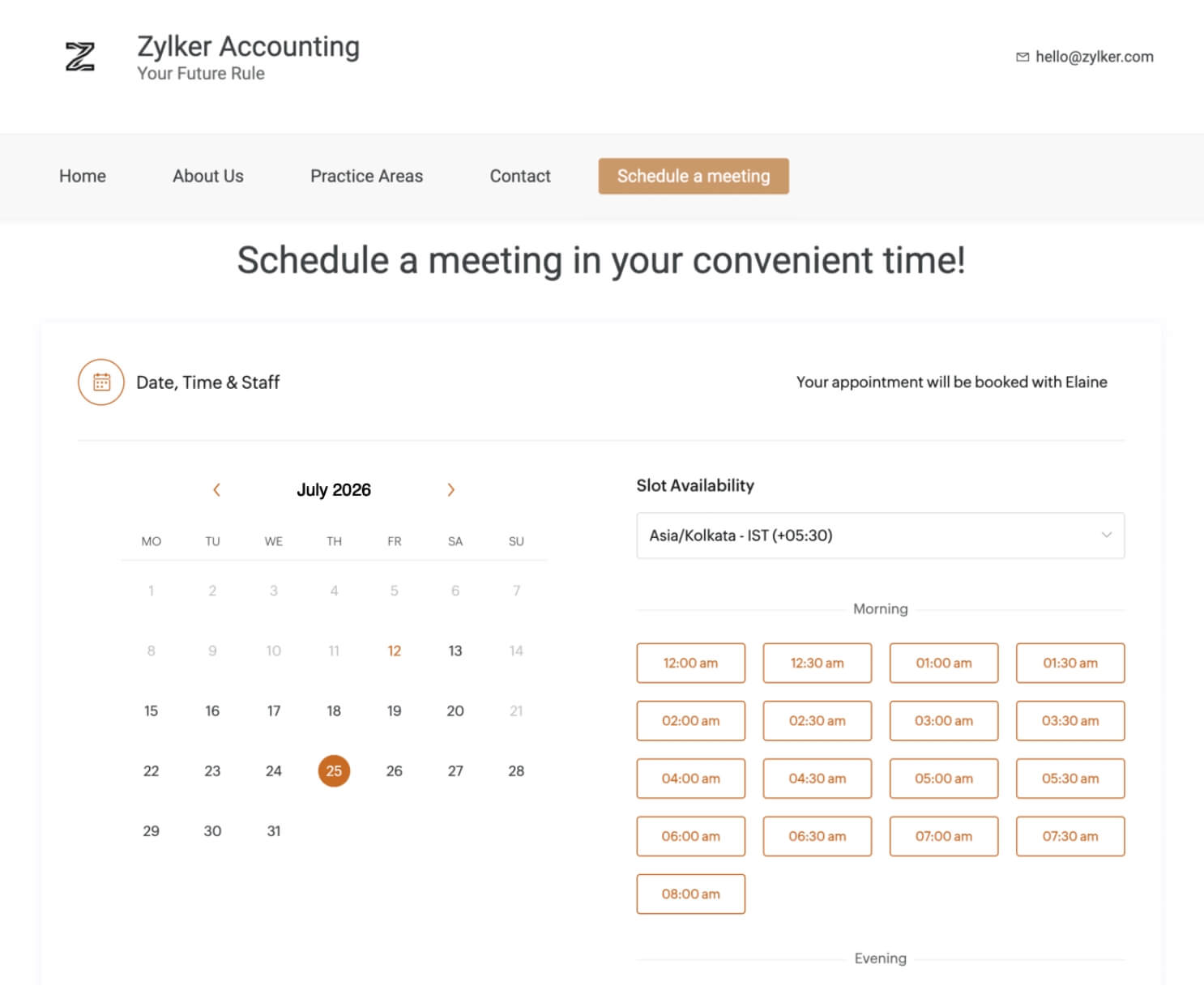
3) Schedule meetings with leads from your web chat
Chatbot functions—like a real-time lead qualifier—accelerate the sales process. Based on the lead's interactions, you can route them to the relevant resources or online agents, or provide them with the option to schedule a discovery or demo call if they are qualified.
With the Zoho Bookings and Zoho SalesIQ integration, you can configure a chatbot that offers booking slots directly in the chat window, or have a live agent share meeting availability with the lead once they're qualified. Access lead information and meeting details right from Zoho Bookings, and sync them with your CRM as well.
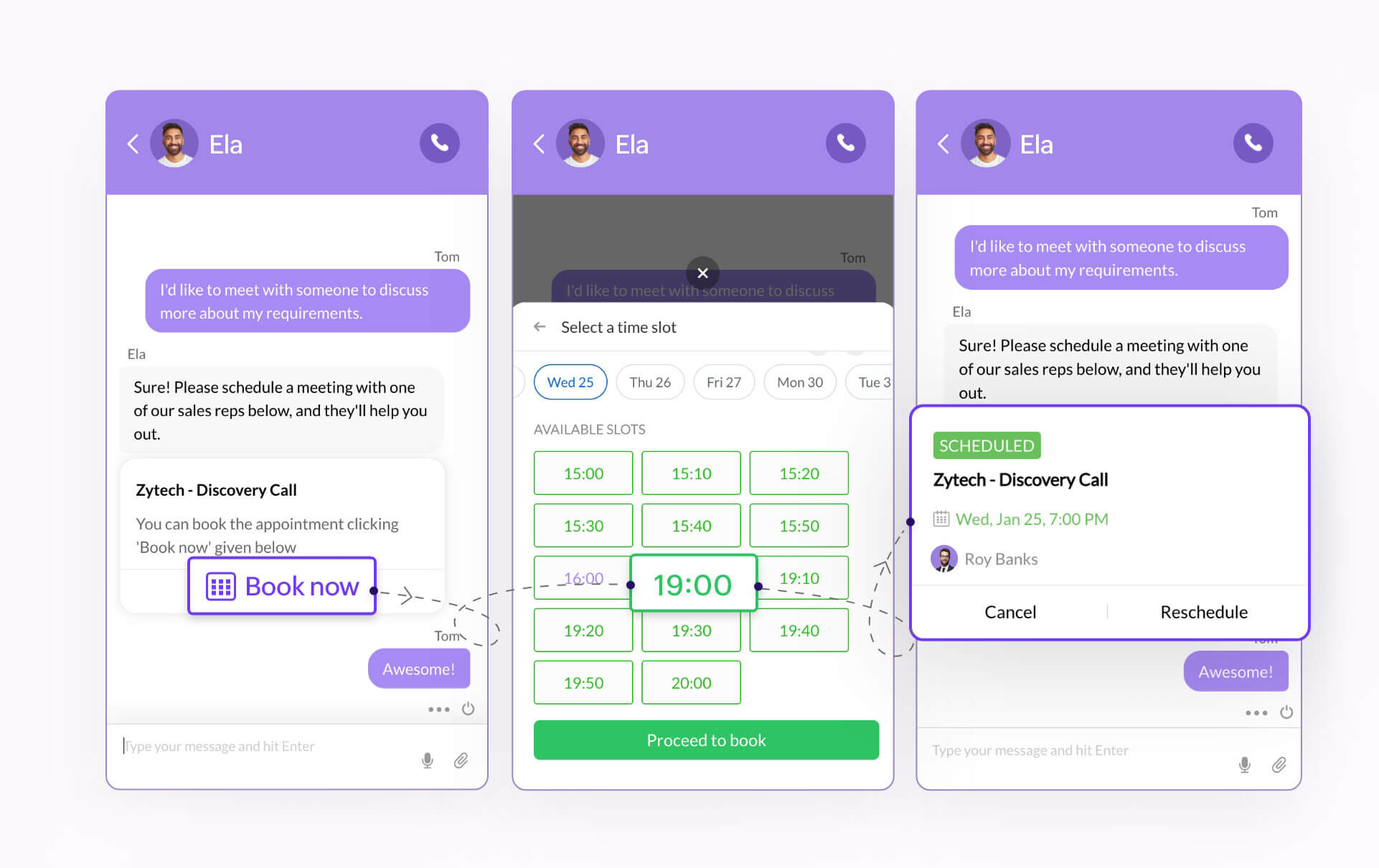
4) Categorize meeting types based on lead stage
With Zoho Bookings, you can create different meeting types for various stages of the sales funnel.
- Request information -> TOFU leads
- Talk to sales or book a discovery call -> MOFU leads
- Schedule a demo or pricing call -> BOFU leads
You can create one-on-one meetings, group meetings, or panel meetings and assign them to specific sales reps. Each meeting type can also have unique booking forms to collect information from leads.
Sales teams can then generate reports to gain insights into the different stages and make necessary tweaks to the lead qualification process.
Plus, set up custom workflows for each meeting to send follow-up emails, sync data to your CRM, and streamline other scheduling tasks.
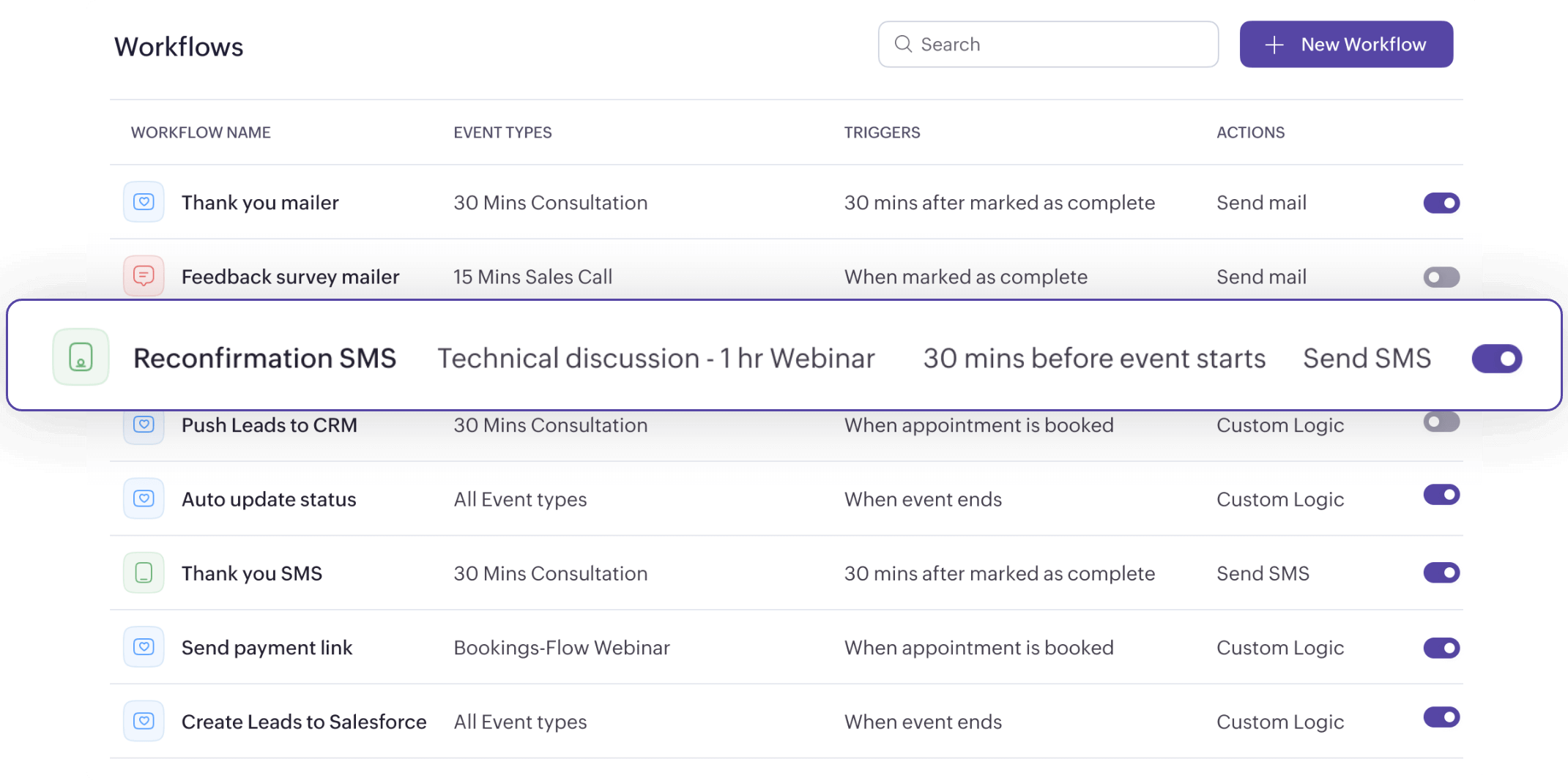
5) Accelerate lead qualification from your CRM
Booking links are handy across different channels, and they offer a significant advantage when paired up with your CRM. By integrating Zoho Bookings and Zoho CRM, for example, you can use booking links to:
- Schedule meetings with leads directly within the Zoho CRM dashboard.
- Include booking links in automated email templates to engage with leads.
- Send emails to leads with a booking link as soon as they achieve the required lead score inside Zoho CRM.
- Set up various workflows to move leads across the pipeline and trigger emails with a booking link to schedule meetings quickly.
- Nurture leads separately based on their stage in the sales funnel and share booking links associated with the right sales rep.
Combining the power of Zoho Bookings with your CRM enables your sales teams to engage and convert leads into customers consistently, without any friction or delays.
